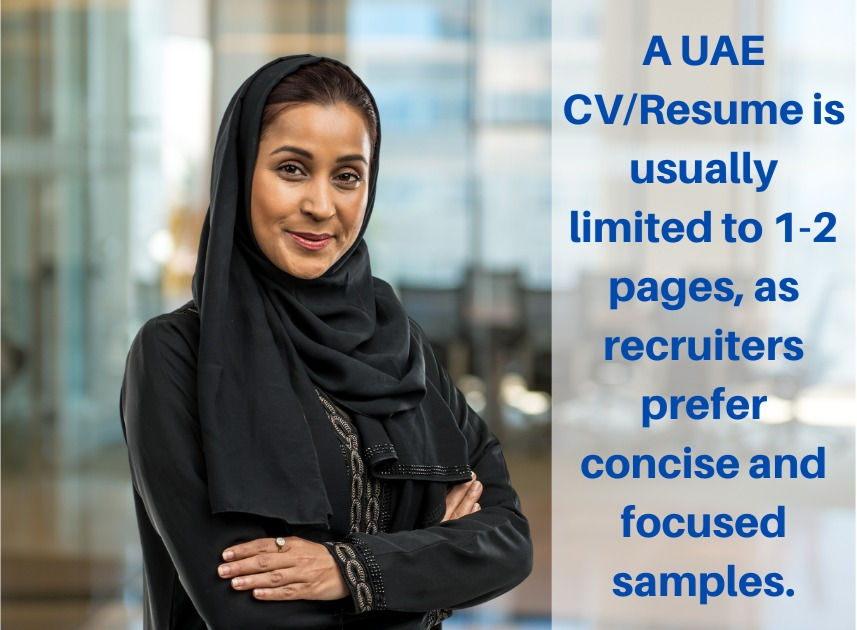An ultimate guide to the UAE CV format you need in 2023
- Nora Jesic
- May 1, 2023
- 5 min read
Updated: May 2, 2023

When it comes to self-marketing, every country or region has unwritten rules. Be it a CV, Resume, LinkedIn, or website portfolio, there are certain expectations based on cultural, legal, and other locale-specific factors.
To stand out in a competitive job market, it is important to understand what is expected of you and how your CV should look. In this article, we will provide a guide to the informal UAE CV format for 2023, including tips on how to write a winning CV that can help you land your dream job.

Is there even a UAE CV format?
A typical CV in the UAE has some unique characteristics that differ from international standards. In the UAE, the terms CV and Resume are often used interchangeably. Thus, the preferred length of a CV in the UAE is shorter.

Interestingly, personal details hold significant importance in UAE culture. Therefore, including a professional profile photo, age, nationality, and marital status is common practice in CVs. However, it's important to note that including personal details in a CV is not mandatory, and candidates should follow their comfort level.
So, yes. An informal UAE CV format based on employer expectations became a norm throughout the decades, which local hiring managers consider sensible today.
How to use the UAE CV format to your advantage?
To increase the chances of success, it's crucial to tailor your CV for each job application in the UAE. This means aligning your CV with the job requirements and the company culture.
Using relevant keywords and highlighting relevant experience that matches the job description is crucial. Additionally, showcasing language skills, particularly English and Arabic, commonly used in business settings, will be advantageous.

Optimising your CV for the job application is also necessary because many companies in the UAE use Applicant Tracking Systems (ATS) to process great volumes of CVs faster. ATS scans for keywords and relevant information in your CV that matches the job requirements. This means that poorly formatted CVs may not pass through the initial screening process, regardless of your qualifications and experience.
Make sure to avoid common mistakes:
Irrelevant information - do not mention unrelated hobbies or personal details that do not contribute to the job application.
Unprofessional language or making cultural faux pas - avoid wordings that might show disrespect towards the local culture and customs.
Inaccurate and dishonest information - false information can have serious consequences, including legal repercussions in the UAE.
How to draft a CV that satisfies UAE employer expectations in 2023?
If you are out to find a job that aligns with your past experience and skills and provides a generous salary, the first step is creating an impressive CV.
Professional CV writers in the UAE are well-versed in local recruitment processes and in the picture with general trends. Nonetheless, you can set out on a research journey on your own if you have the right skills and a knack for writing.
Regardless of which of the two options you decide on, the key sections of the UAE CV are:

1. Professional Summary
A strong opening summary is what attaches a personality to the name or the photo. It rounds up the HR person's perception of you while suggesting that you have more to offer if they read along. A well-written personal statement in 2-3 sentences should highlight your key skills, experience, and career goals.
Be specific and tailor it to the job you are applying for.
2. Work Experience
Some would say job history, but your experience is not based on a list of previous employment relationships. In this section, you must emphasise your work experience, starting with your most recent job.
The job title comes first in bold. Hiring managers instantly need to see what you offer, and that is not the name of the company or its location. Furthermore, briefly describing your responsibilities and accomplishments will round up the story.
3. Personal Information

Europe and the US have strong anti-discrimination laws that discourage sharing personal information during recruitment, which should make it less biased.
This is not the case in the UAE, where hiring managers are used to applicants sharing their photo, date of birth, nationality, marital status, whether they have a driving license, gender, location, and language. Based on the given information, they can factor in the type of accommodation, relocation package, school allowance, salary benchmark, and other requirements when considering candidates.
4. Education
Provide details of your educational qualifications, starting with your most recent degree, including the names of the institution, location, and the year of completion.
5. Skills
A bulleted list of skills relevant to the job posting can complement your work experience. This section usually includes technical skills, language proficiency, software proficiency, and other relevant skills that make you stand out.
6. Achievements
This section on your CV can include awards, recognition, and measurable accomplishments demonstrating your capabilities and achievements in your previous roles.
3 important points to keep in mind for a successful UAE CV
Keywords

Many companies use ATS to filter out relevant candidates. ATS looks for keywords that correspond to the advertised position, so using specific keywords mentioning your expertise and experience that match the job description can help your CV get past the initial screening process.
Length
Normally the length of your CV depends on your previous work experience, achievements, and education. In general, recruiters in the UAE expect at least a 2 pages CV for mid-career professionals. On the other hand, an entry-level applicant will only have a one-page CV, which is the exact expectation for that career level.
Layout
The reverse chronological CV format is the most popular and expected in the UAE because it immediately points to your most recent career achievements. Your most recent job position should be added first, with a short but to-the-point description of responsibilities.

This also applies to the education section in the UAE CV format: Your most recent degree needs to come first because this is the most relevant information the hiring manager wants to see after listing your previous experience.
If you are an entry-level candidate without previous experience, you should emphasise
your educational journey with the most recent degree on top.
In conclusion
The key takeaway is that job seekers in the UAE must comprehend the distinctive CV format of the country and customise their CVs accordingly. Adhering to these guidelines will enable you to draft an individualised and effective CV, increasing your odds of being shortlisted for an interview.
It is worth noting that hiring managers prefer visual CVs these days, so it is useful to make your CV visually skimmable and appealing. If you find it hard to do it on your own, no worries. There are expert CV writers out there whose job is to design your CV to the liking of hiring managers in the UAE. Do not hesitate to reach out, it might be your chance to land your dream job.



